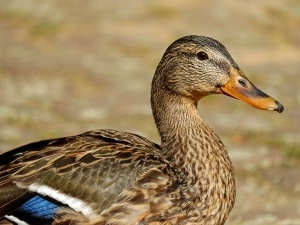
Wheezing is a bad sign in humans, ducks, and in other animals. If you notice one of your ducks wheezing you’d be right to be worried, this article looks into why this happens.
Table of Contents
Duck wheezing:
Maintaining your duck’s health is important if you want your bird to live a long and healthy life, wheezing generally means that the bird is ill or something is wrong with the bird.
If you notice that one, or more, of your ducks have started wheezing then you’d need to figure out what’s going on and treat the problem quickly.
Here are possible reasons why your duck may be wheezing:
Poor hygiene:
When ducks take a breath the air travels through the bird’s nares (nostrils) into the bird’s body. Clogged nares will cause the bird to start wheezing.
Ducks need to clean their nares on a regular basis, they clean their nares by dipping their heads in water.
Birds need access to waterers that are deep enough to allow effective nare cleaning to happen, if the waterer isn’t deep enough then a thorough cleaning won’t happen and the bird’s nares will clog up.
Regular and thorough cleaning will keep the bird’s nares open.
The waterer also needs to be shallow enough to keep the bird from drowning, and heavy enough to prevent tipping.
What to do:
Make sure that your bird’s waterer is deep enough to where the bird can dunk its whole head under water. If the waterer isn’t deep enough then you’d need to get a new waterer.
Unclean environment:
Ducks need to be kept in very clean environments, environments that are vacuumed or swept thoroughly are ideal.
If your bird’s environment isn’t clean then the bird may inhale objects in its environment which can block the bird’s nares. Irritants in the bird’s environment may also irritate the bird’s nares and cause the bird to start wheezing.
Something as simple as incorrect bedding can be an irritant. If the wrong bedding is used in the duck houses then this can cause the bird to start wheezing.
Bedding that is dusty can cause wheezing and so can air fresheners.
What to do:
Use bedding that won’t irritate the bird’s nares. Aspen shavings and/or large flake pine shavings are commonly used as bedding for ducks.
Aspen shavings are a good choice because they are hypoallergenic this means that you can use them even if you have allergies or if your other animals have allergies. Plus, using them will make virtually no dust.
Aspen shavings can be expensive but if you can afford them they make great bedding for ducks. If the wheezing is caused by bedding then using aspen shavings as bedding will eliminate your bird’s wheezing.
Large flake pine shavings can also be used in your duck’s coop. Large flake pine shavings produce no or low dust when used. In addition, large flake pine shavings are antimicrobial so mold and bacteria will not readily grow on them.
Using this as bedding will keep respiratory problems, like wheezing, from developing in your bird.
If your bird’s wheezing is caused by air fresheners make sure to only use the air fresheners away from ducks.
Avian cholera:
Your duck may be wheezing because the bird has Avian Cholera. This disease is caused by the bacterium Pasteurella multocida. Other names for this disease include Fowl Cholera and Pasteurella infection
This disease affects not only ducks but swans, coots, geese, crows, gulls, and shorebirds. It is a highly contagious bacterial disease that can lead to the death of your whole flock causing death as early as 24 hours after infection.
Other signs of a bird suffering from this disease, other than the wheezing, include yellow or blood-stained droppings, mucus discharge from the mouth, swimming in circles, fever, reduced feed consumption, convulsions, erratic flight, soiling or matting of feathers, and bill, eye, and nasal discharge.
Some birds may suddenly die without obvious signs of having this disease
What to do:
This illness can be mistaken for other illnesses so diagnosing the bird yourself can be difficult. The best you can do for your duck is to get it to a vet, an avian vet if you can, to be diagnosed.
Birds who contract this disease will be carriers for life. Antibiotics will stop deaths and symptoms of this disease in your flock, but deaths and symptoms of this disease will come back once the antibiotics are discontinued.
Treating the birds for prolonged periods of time by adding antibiotics to the bird’s feed and water, as well as injecting the birds, will keep the birds alive.
Vaccination will prevent this disease from becoming a problem in your flock. Only vaccinate for this disease if you know that you have this problem on your farm
Good sanitation, as well as rodent control, will also keep your flock safe.
Good sanitation involves keeping your domestic birds away from wild birds, disposing of dead birds correctly, and regular cleaning and disinfecting of all houses
If you enjoyed this article then you may also be interested in other duck related articles. Here are some articles that you may be interested in: Duckling Breathing Heavy, Duckling Umbilical Hernia, Why Do Ducks Kick Eggs Out Of A Nest, Internally Pipping Duck Eggs

